AIIB looks to be efficient, 'green'
Updated: 2015-04-20 13:39
By Hua Shengdun in Washington(China Daily USA)
|
||||||||
The Asia Infrastructure Investment Bank (AIIB) will strive to be efficient, effective and sustainable, which is a consensus among members, China's Finance Minister said in Washington.
"In many international organizations, it often takes more than three to five years for a project to launch, which we should avoid," Minister Lou Jiwei said during an April 18 interview with major Chinese media organizations.
"We would not bureaucratize the AIIB," Lou said. "Instead, we need to be efficient and 'green'."
Lou is attending the G20 Finance Ministers and Central Bank Governors Meeting during this year's World Bank/IMF Spring meetings, along with Zhou Xiaochuan, governor of the People's Bank of China.
Lou stated that the AIIB would simplify the governance structure that many international organizations use.
He said the key lies in "the principal-agent relationship between shareholders and managers", in which the governments would be the "shareholders", while "managers" are the appointed president and staff.
"The principle above all is that managers should be accountable to shareholders, while shareholders should have restricting power on managers through the board of directors," said Lou, who has served as chairman of China Investment Corp, a sovereign wealth fund.
Lou said that dealing with and gathering many nations in one bank is not necessarily complicated. Members would be divided into two categories: regional members and non-regional members.
The regional members would have 75 percent of capital stock, while non-regional members get the other 25 percent. The allocation among regional members would primarily be based on weighted GDP, with large economies transferring part of their voting power to small economies; non-regional members could decide allocation by themselves, Lou said.
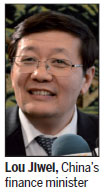
When asked about economic growth in China, Lou said that as long as China's total factor productivity (TFP) increases, its economy would grow more than what the IMF had forecast.
"If major reforms will be continuously put into effect, we can keep the economic growth around 7 percent," Lou said.
The IMF released the World Economic Outlook (WEO) on April 14, forecasting economic growth of 6.8 percent in China this year and 6.3 percent in 2016r.
Lou was optimistic about Hukou reforms, the policy on transfer of management rights of contracted rural lands, and the establishment of Circuit Court.
"I am not sure whether the IMF put these reforms into calculation; if so, I am confident that the percentage would be higher," he said.
Liu Xiaoxian in Washington contributed to this story.
(China Daily USA 04/20/2015 page1)
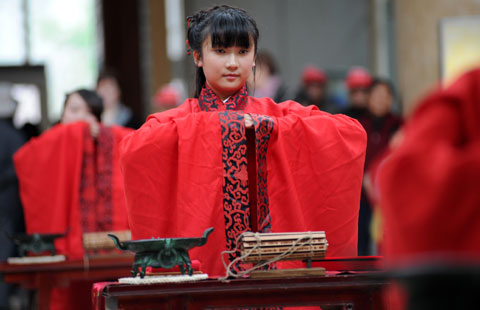
 Girls celebrate adulthood in NW China
Girls celebrate adulthood in NW China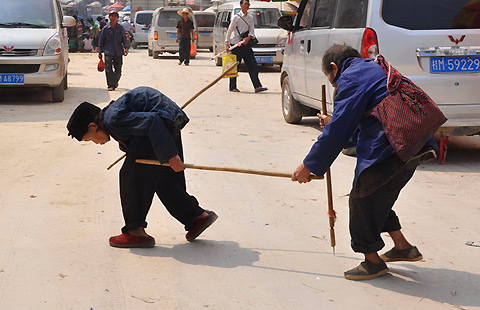
 Couple linked by a stick
Couple linked by a stick
 Natural History Museum opens in Shanghai
Natural History Museum opens in Shanghai
 Japanese WWII surrender video debuted at China museum
Japanese WWII surrender video debuted at China museum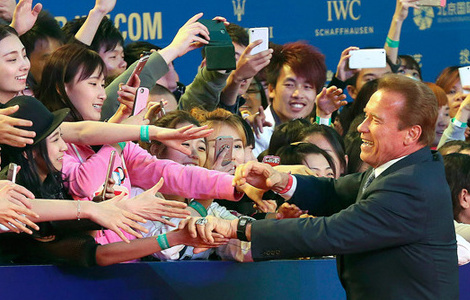
 Beijing film festival draws top moviemakers, Oscar winners
Beijing film festival draws top moviemakers, Oscar winners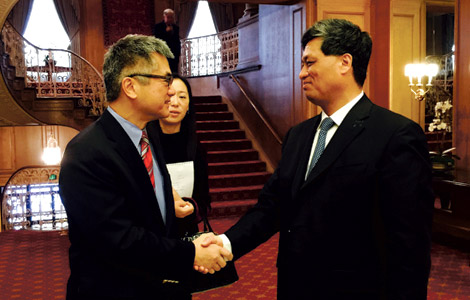
 Across America over the week (from April 10 to 16)
Across America over the week (from April 10 to 16)
 Historic hotels offer more than a view
Historic hotels offer more than a view
 Top 10 foreign holders of US Treasuries
Top 10 foreign holders of US Treasuries
Most Viewed
Editor's Picks

|

|

|

|

|

|
Today's Top News
AIIB looks to be efficient, 'green'
Bridging cultures with laughter and song
Central bank lowers reserve ratio
Envoy sees many benefits from Xi's Pakistan visit
China concerned at reports of New Zealand-US plan to spy on diplomats
Old Summer Palace may sue over controversial replica
China and the 2016
US election
World Bank, IMF: will work
with AIIB
US Weekly

|

|





